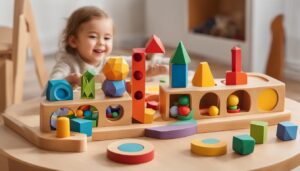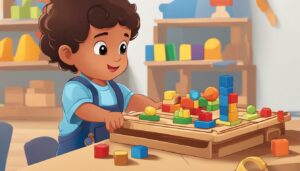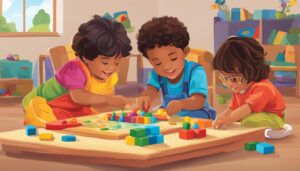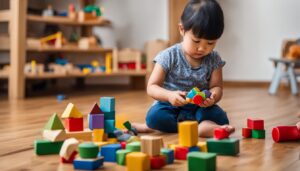When it comes to your child’s development, you want to give them every advantage possible. That’s where Montessori toys come in. These unique toys are not only fun and engaging, but they also offer a range of benefits that can positively impact your child’s growth and learning.
Montessori education, which includes the use of Montessori toys, has been proven to foster long-term psychological health and wellbeing in children. Adults who attended Montessori schools during their childhood reported higher levels of general wellbeing, engagement, social trust, and self-confidence compared to those who had conventional schooling.
So, what makes Montessori toys so special? These toys align with the Montessori philosophy of self-determination, engagement in meaningful activities, and social stability within the classroom. By offering open-ended play and hands-on learning, Montessori toys provide children with the opportunity to explore their interests, build essential skills, enhance their creativity, and contribute to their overall development.
Key Takeaways:
- Montessori education and toys promote long-term psychological health and wellbeing in children.
- Montessori toys offer open-ended play and hands-on learning opportunities.
- Children who engage with Montessori toys develop essential skills and enhance their creativity.
- Montessori toys align with the principles of self-determination and meaningful engagement.
- Incorporating Montessori toys can positively impact your child’s development and future success.
The Advantages of Montessori Toys for Child Development
Montessori toys have gained recognition for their positive impact on child development. These thoughtfully designed toys offer numerous advantages that contribute to the holistic growth of children. As children engage with Montessori toys, they experience a range of developmental benefits that support their cognitive, physical, and emotional well-being.
One of the primary advantages of Montessori toys is their ability to provide age-appropriate activities that stimulate various aspects of child development. These toys are carefully crafted to cater to different stages of childhood, from infancy to early childhood. By incorporating elements such as sensory exploration, fine motor skills development, and problem-solving opportunities, Montessori toys foster the overall cognitive development of children.
Table: Advantages of Montessori Toys for Child Development
| Advantages | Description |
|---|---|
| Stimulate sensory exploration | Montessori toys engage children’s senses, allowing them to develop their senses of touch, sight, sound, and more. |
| Promote fine motor skills | These toys require precise movements, helping children refine their hand-eye coordination and dexterity. |
| Enhance cognitive development | Through problem-solving activities, Montessori toys stimulate critical thinking, logic, and reasoning abilities. |
| Foster creativity and imagination | Open-ended play with Montessori toys encourages children to think creatively, invent stories, and explore their imagination. |
| Develop independence and concentration | By engaging in self-directed play, children develop their ability to focus, concentrate, and work independently. |
| Build confidence and self-esteem | As children successfully navigate challenges presented by Montessori toys, they gain a sense of achievement and boost their self-confidence. |
Montessori toys also promote independent play and self-directed learning. By giving children the freedom to explore and make choices during playtime, these toys foster independence, decision-making skills, and a sense of autonomy. This approach empowers children to take ownership of their learning journey, building resilience and a growth mindset.
Furthermore, Montessori toys often incorporate natural materials, which provide additional benefits. These materials are safe for children to interact with, ensuring their well-being while engaging in play. Additionally, the use of natural materials aligns with the Montessori philosophy of nurturing an appreciation for the environment and sustainability.
In summary, Montessori toys offer a range of advantages for child development. These toys stimulate sensory exploration, promote fine motor skills, enhance cognitive development, foster creativity and imagination, develop independence and concentration, and build confidence and self-esteem. By incorporating Montessori toys into children’s playtime, parents and educators can provide enriching experiences that support their overall growth and development.
Montessori Toys vs. Traditional Toys: The Impact on Child Development
When it comes to choosing toys for your child, you may be overwhelmed by the wide array of options available. One important consideration is the impact that different types of toys can have on your child’s development. Montessori toys and traditional toys offer contrasting approaches to play and learning, each with their own benefits and limitations.
Montessori toys focus on promoting hands-on learning, independent play, and problem-solving skills. These toys are designed to engage children in meaningful activities that encourage exploration and critical thinking. Unlike traditional toys that often rely on flashing lights and sounds to capture children’s attention, Montessori toys prioritize open-ended play and creativity. By offering children the opportunity to manipulate objects, solve puzzles, and engage in imaginative play, Montessori toys stimulate cognitive development and foster essential skills such as concentration and self-directed learning.
Traditional toys, on the other hand, are often designed for immediate entertainment value. They may provide short-term amusement but may not necessarily contribute to long-term development. While these toys can be enjoyable, they may not offer the same level of engagement and skill-building opportunities as Montessori toys. Traditional toys often have predetermined outcomes and limited possibilities for exploration, which may restrict a child’s creativity and problem-solving abilities.
The Impact of Montessori Toys
Montessori toys have a significant impact on child development. By encouraging hands-on learning, independent thinking, and problem-solving, these toys contribute to the overall growth and development of children. They promote critical thinking skills, creativity, and the ability to learn through trial and error. Unlike traditional toys, Montessori toys provide children with the freedom to explore their interests and develop a sense of autonomy. They also foster social and emotional development by encouraging cooperation and collaboration when children engage in independent or group play.
| Montessori Toys | Traditional Toys |
|---|---|
| Promote hands-on learning and problem-solving | Often rely on flashing lights and sounds for entertainment |
| Encourage open-ended play and creativity | Have predetermined outcomes and limited possibilities |
| Stimulate cognitive development and concentration | Provide short-term amusement but limited skill-building opportunities |
Ultimately, the choice between Montessori toys and traditional toys depends on your child’s individual needs and interests. While traditional toys may offer immediate entertainment, Montessori toys provide a more holistic approach to child development. By fostering independence, creativity, and critical thinking, Montessori toys contribute to the overall growth and wellbeing of children.

Conclusion
Montessori toys offer a unique approach to child development and learning. Based on the principles of Montessori education, these toys prioritize hands-on learning, independent play, and self-directed exploration. Research has shown that Montessori education, which includes the use of Montessori toys, has numerous benefits for children’s long-term psychological health and wellbeing.
By providing children with open-ended play opportunities, Montessori toys promote skill-building, creativity enhancement, and overall development. These toys offer a safe and stimulating environment for children to explore, learn, and grow. Whether your child attends a Montessori school or not, incorporating Montessori toys into their playtime can have a positive impact on their development and future success.
So why are Montessori toys good for child development? It’s because these toys align with the Montessori education philosophy, which focuses on fostering independence, concentration, and confidence in children. Montessori toys encourage children to explore their interests, engage in independent play, and learn through trial and error. With their emphasis on hands-on learning and problem-solving, Montessori toys contribute to the development of essential skills, such as critical thinking and creativity. The use of natural materials in these toys also ensures their safety and environmental friendliness, making them a preferred choice for many parents.




